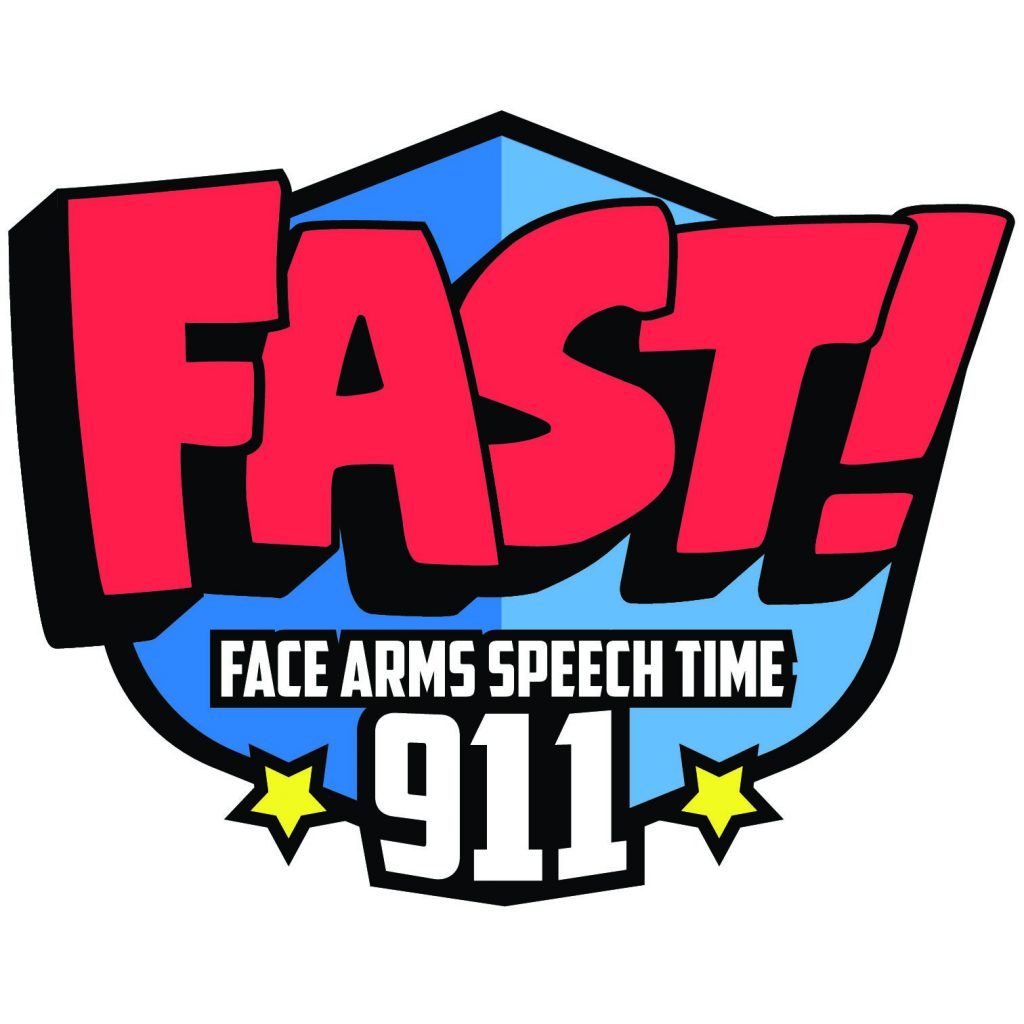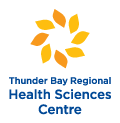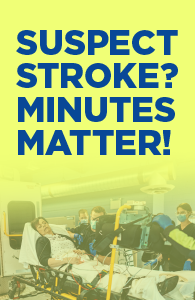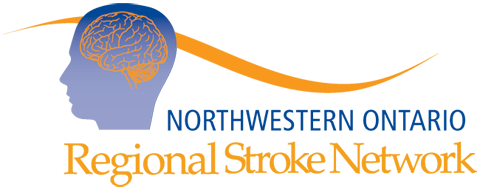Stroke: Brain Attack!

The ability to recognize the FAST signs of stroke and act fast by calling 9-1-1 or your local emergency number can mean the difference between life and death. It can also mean the difference between a full recovery and a lasting disability. When one thinks of paramedics and ambulances, the first thought associated is often “car accidents and heart attacks”. Paramedics want to bring the messaging forward that having a stroke is a medical emergency!
Wait…what IS a Stroke?
A stroke happens when blood stops flowing to any part of your brain, damaging brain cells. The effects of a stroke depend on the part of the brain that was damaged and the amount of damage done. In other words, every minute counts. Time is Brain! What this means is the longer your brain is under attack, the more functions your brain loses.
There are some risk factors of a stroke that you can control and others that you cannot. You can help prevent a stroke by eating a healthy diet, maintaining a healthy weight, staying active and reducing stress.
Did you know that stroke is the number three killer of Canadians, and that it is the leading cause of disability? There are an estimated 62,000 strokes in Canada each year, which is one every nine minutes. More than 80 per cent of individuals who have a stroke and make it to the hospital will survive, with varying degrees of recovery.
Wow! This is a lot to take in and some of it sounds really bad, what is being done about this?
The Heart and Stroke Foundation of Canada works very diligently at providing information on preventing strokes, risk factors, signs of a stroke and recovery and support. There is the FAST campaign that you may or may not have heard about. It was blogged about on January 21st, 2019 on this OAPC site and it’s a good read if you haven’t already read it (https://www.oapc.ca/act-fast-partner-heart-stroke-raise-awareness-signs-stroke-save-lives/). The FAST messaging was added to the sides of ambulances of well over 450 ambulances in Ontario, including ours. Paramedic Services wanted to raise awareness of the signs of stroke and the importance of acting quickly by placing decals with the signs of stroke acronym ‘FAST’ on all of their ambulances. The ‘FAST’ decals remind people of the 3 signs of stroke (Face, Arms, and Speech) and encourage people to seek emergency care right away by calling 911.
This is some positive news! What’s next for the Superior North EMS and Stroke?
The Superior North Emergency Medical Service (SNEMS) services a very large geographical area, roughly equivalent to the size of Guatemala (we are slightly smaller and a lot colder!). We do this with 19 EMS stations, approximately 200 front line paramedics and 16 management and administrative staff. We have a fleet of 46 vehicles and respond to approximately 33,000 calls per year. Data shows that the Northwestern Ontario region has been the lowest performers of calling 911 for stroke care for the past 5 years. We are not only the lowest in Ontario BUT we are also the lowest in Canada.
This is not good! How do we get more people to call 9-1-1 when they are having a stroke?
You’re right, time matters! We have worked very diligently with our partners at the Northwestern Ontario Regional Stroke Network on how to optimize stroke care in our region. There are the FAST logos, stroke education campaigns and other public awareness blitzes that we support to help educate people, but maybe that has not been enough.
What if someone had an idea …?
The FAST Heroes 112 (911) campaign! This campaign was developed in Europe where their emergency system phone number is 1-1-2, not 9-1-1 (fun fact!). The Department of Educational and Social Policy of the University of Macedonia with support from the Angels Initiative (https://www.angels-initiative.com/) has designed an education program for children 5-7 years old. Through the program, the children will be trained to remember the 3 most important signs of Stroke by linking them to the number 9-1-1. The ultimate goal is for the children to educate their parents and grandparents. Using animation and a cast of quirky superheroes, the FAST Heroes campaign is able to tackle this difficult topic in a fun and engaging way. They have Franc the Face, Armando the Arms, Sophia the Singer and Timmy on Time (see what they did there?). If you want to see the quirky characters or learn a little more about this specific program, please click here: https://fastheroes.com
In March of this year, Keli Cristofaro of the NWO Regional Stroke Network and myself were invited to Mainz, Germany to participate in a FAST Heroes 1-1-2 workshop. We learned about the true “heroes” in this program, the science behind educating children on stroke and how teaching children the signs of stroke and how to call 9-1-1, can make a difference. This program is a lot more than a short stroke campaign, reminder decal or education blitz, this is teaching your kids and grandkids how to recognize a stroke and how to call 9-1-1. They learn how they can help! They then take this information home to you, their parents and grandparents, and now everybody knows! There are components of the program that you do together at home to reinforce the learning, and it’s fun! “The more you know!” … like a good after school special!
This sounds great! When does it start?
It is an amazing opportunity! Currently this program has been rolled out in a few European countries, starting in Greece. They have had great success with it and a lot of positive feedback. We needed to have the program “translated” into the 9-1-1 format first so that it can be used in North America. The NWO Regional Stroke Network, together with the SNEMS, have been given the fantastic honour to be the pioneers of this program here in North America. We will be the first city in Canada to bring this FAST Heroes education to your children and grandchildren. As I write this blog, we don’t have a definitive start date yet but we know when it does start it will have a big impact and we are excited!
Final thoughts…
Stroke can and does affect anyone and everyone, it does not discriminate. We want to do the best that we can to try and improve the chances of survival and lessen the impact that a stroke has on the people in our communities. Can a child really make a difference? Absolutely! CBC news reported on a story last year (2018) where an 8 year old boy called 9-1-1 when his father suffered a stroke while he was making dinner. You can read this fantastic story here https://www.cbc.ca/news/canada/calgary/calgary-boy-jumps-into-action-as-father-suffers-stroke-1.4706452.
Maybe we will never be able to save everyone but can you imagine the difference that we can make for even one family?






